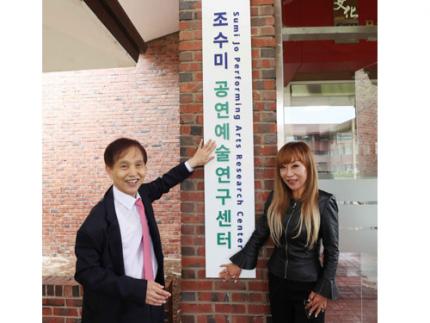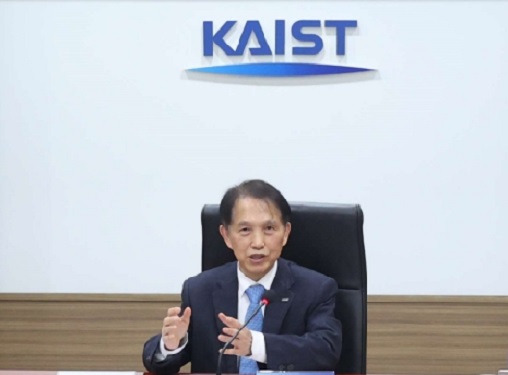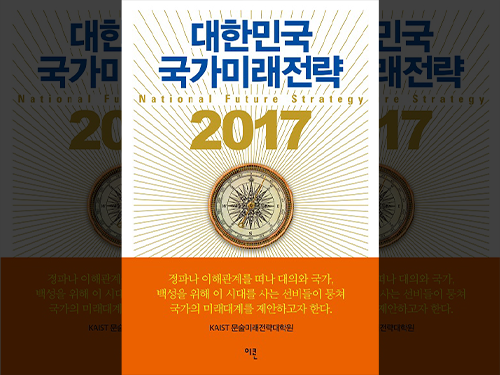Kwang+Hyung+Lee
-
 A 10-Month Journey of Tiny Flaps Completed: A Special Family Returns to KAIST Duck Pond
On the morning of June 9, 2025, gentle activity stirred early around the KAIST campus duck pond. It was the day a special family of ducks—and two goslings—were to be released back into the pond after spending a month in a temporary shelter. One by one, the ducklings cautiously emerged from their box, waddling toward the water's edge and scanning their surroundings, followed closely by their mother.
< The landscape manager from the KAIST Facilities Team releases the ducks and goslings. >
The mother duck, once a rescued loner who couldn’t integrate with the flock, returned triumphantly as the head of a new family—caring for both ducklings and goslings. Students and faculty looked on quietly, welcoming them back and reflecting on their remarkable 10-month journey.
The story began in July 2024, as a student filed a report of spotting two ducklings wandering near the pond without a mother. Based on their soft down, flat beaks, and lack of fear around humans, it was presumed they had been abandoned. Professor Won Do Heo of the Department of Biological Sciences—affectionately known as the “Goose Dad”—and the KAIST Facilities Team quickly stepped in to rescue them. After about a month of care, the ducklings were released back into the pond.
< On June 9, the day of the release, KAIST President Kwang-Hyung Lee (left), the former “Goose Dad,” and Professor Won Do Heo (right), the current “Goose Dad,” watched the flock as they freely wobbled about. >
At first, the ducklings seemed to adapt, but they started distancing themselves from the established goose flock. One eventually disappeared, and the remaining duckling was found injured by the pond during winter. Although KAIST typically avoids making human interference in the natural ecosystem, an exception was made to save the young duck’s life. It was put under the care of Professor Heo and the Facilities Team to regain its health within a month.
In the spring, the healed duck began laying eggs. Professor Heo supported the process by adjusting its diet, avoiding further intervention. On Children’s Day, May 5, the duck’s eggs hatched. The once-isolated duck had become a mother. Ten days later, on May 15, four goslings also hatched from the resident goose flock. With new life flourishing, the pond was more vibrant than ever.
< Rescued baby goslings near the pond, alongside the duck family that took them in. The mother duck—once a vulnerable duckling herself—had grown strong enough to care for others in need. >
But just days later, the mother goose disappeared, and two goslings—still unable to swim—were found shivering by the pond. Dahyeon Byeon, a student from Seoul National University who came for a visit on that day, reported this upon sighting, prompting another rescue. The vulnerable goslings were brought to the shelter to stay with the duck family.
Initially, the interspecies cohabitation was uneasy. But the mother duck did not reject the goslings. Slowly, they began to eat and sleep together, forming a new kind of family. After a month, they were released together into the pond—and to everyone’s surprise, the existing goose flock accepted both the goslings and the duck family.
< A peaceful moment for the duck family. The baby goslings naturally followed the mother duck. >
It took ten months for this family to return. From abandonment and injury to healing, birth, and unexpected bonds, this was more than a story of survival. It was a journey of transformation. The duck family’s ten-month saga is a quiet miracle—written in small moments of crisis, care, and connection—and a lasting memory on the KAIST campus.
< The resident goose flock at KAIST’s pond naturally accepted the returning duck and goslings as part of their group. >
2025.06.10 View 1267
A 10-Month Journey of Tiny Flaps Completed: A Special Family Returns to KAIST Duck Pond
On the morning of June 9, 2025, gentle activity stirred early around the KAIST campus duck pond. It was the day a special family of ducks—and two goslings—were to be released back into the pond after spending a month in a temporary shelter. One by one, the ducklings cautiously emerged from their box, waddling toward the water's edge and scanning their surroundings, followed closely by their mother.
< The landscape manager from the KAIST Facilities Team releases the ducks and goslings. >
The mother duck, once a rescued loner who couldn’t integrate with the flock, returned triumphantly as the head of a new family—caring for both ducklings and goslings. Students and faculty looked on quietly, welcoming them back and reflecting on their remarkable 10-month journey.
The story began in July 2024, as a student filed a report of spotting two ducklings wandering near the pond without a mother. Based on their soft down, flat beaks, and lack of fear around humans, it was presumed they had been abandoned. Professor Won Do Heo of the Department of Biological Sciences—affectionately known as the “Goose Dad”—and the KAIST Facilities Team quickly stepped in to rescue them. After about a month of care, the ducklings were released back into the pond.
< On June 9, the day of the release, KAIST President Kwang-Hyung Lee (left), the former “Goose Dad,” and Professor Won Do Heo (right), the current “Goose Dad,” watched the flock as they freely wobbled about. >
At first, the ducklings seemed to adapt, but they started distancing themselves from the established goose flock. One eventually disappeared, and the remaining duckling was found injured by the pond during winter. Although KAIST typically avoids making human interference in the natural ecosystem, an exception was made to save the young duck’s life. It was put under the care of Professor Heo and the Facilities Team to regain its health within a month.
In the spring, the healed duck began laying eggs. Professor Heo supported the process by adjusting its diet, avoiding further intervention. On Children’s Day, May 5, the duck’s eggs hatched. The once-isolated duck had become a mother. Ten days later, on May 15, four goslings also hatched from the resident goose flock. With new life flourishing, the pond was more vibrant than ever.
< Rescued baby goslings near the pond, alongside the duck family that took them in. The mother duck—once a vulnerable duckling herself—had grown strong enough to care for others in need. >
But just days later, the mother goose disappeared, and two goslings—still unable to swim—were found shivering by the pond. Dahyeon Byeon, a student from Seoul National University who came for a visit on that day, reported this upon sighting, prompting another rescue. The vulnerable goslings were brought to the shelter to stay with the duck family.
Initially, the interspecies cohabitation was uneasy. But the mother duck did not reject the goslings. Slowly, they began to eat and sleep together, forming a new kind of family. After a month, they were released together into the pond—and to everyone’s surprise, the existing goose flock accepted both the goslings and the duck family.
< A peaceful moment for the duck family. The baby goslings naturally followed the mother duck. >
It took ten months for this family to return. From abandonment and injury to healing, birth, and unexpected bonds, this was more than a story of survival. It was a journey of transformation. The duck family’s ten-month saga is a quiet miracle—written in small moments of crisis, care, and connection—and a lasting memory on the KAIST campus.
< The resident goose flock at KAIST’s pond naturally accepted the returning duck and goslings as part of their group. >
2025.06.10 View 1267 -
 Sumi Jo Performing Arts Research Center Opens
Distinguished visiting scholar soprano Sumi Jo gave a special lecture on May 13 at the KAIST auditorium. During the lecture, she talked about new technologies that will be introduced for future performing art stages while sharing some of the challenges she experienced before reaching to the stardom of the world stage. She also joined the KAIST student choral club ‘Chorus’ to perform the KAIST school song.
Professor Jo also opened the Sumi Jo Performing Arts Research Center on the same day along with President Kwang Hyung Lee and faculty members from the Graduate School of Culture Technology. The center will conduct AI and metaverse-based performing art technologies such as performer modeling via AI playing and motion creation, interactions between virtual and human players via sound analysis and motion recognition, as well as virtual stage and performing center modeling. The center will also carry out extensive stage production research applied to media convergence technologies.
Professor Juhan Nam, who heads the research center, said that the center is seeking collaborations with other universities such as Seoul National University and the Korea National University of Arts as well as top performing artists at home and abroad. He looks forward to the center growing into a collaborative center for future performing arts.
Professor Jo added that she will spare no effort to offer her experience and advice for the center’s future-forward performing arts research projects.
2022.05.16 View 7579
Sumi Jo Performing Arts Research Center Opens
Distinguished visiting scholar soprano Sumi Jo gave a special lecture on May 13 at the KAIST auditorium. During the lecture, she talked about new technologies that will be introduced for future performing art stages while sharing some of the challenges she experienced before reaching to the stardom of the world stage. She also joined the KAIST student choral club ‘Chorus’ to perform the KAIST school song.
Professor Jo also opened the Sumi Jo Performing Arts Research Center on the same day along with President Kwang Hyung Lee and faculty members from the Graduate School of Culture Technology. The center will conduct AI and metaverse-based performing art technologies such as performer modeling via AI playing and motion creation, interactions between virtual and human players via sound analysis and motion recognition, as well as virtual stage and performing center modeling. The center will also carry out extensive stage production research applied to media convergence technologies.
Professor Juhan Nam, who heads the research center, said that the center is seeking collaborations with other universities such as Seoul National University and the Korea National University of Arts as well as top performing artists at home and abroad. He looks forward to the center growing into a collaborative center for future performing arts.
Professor Jo added that she will spare no effort to offer her experience and advice for the center’s future-forward performing arts research projects.
2022.05.16 View 7579 -
 President Lee Presents Plans to Nurture Next-Generation Talents
President Lee stressed that nurturing medical scientists, semiconductor R&D personnel, startup entrepreneurs, and global innovators are key missions he will continue to pursue during a news conference
KAIST President Kwang Hyung Lee said that nurturing medical scientists, semiconductor R&D personnel, startup entrepreneurs, and global innovators are key missions he will continue to pursue during an online news conference marking the 1st anniversary of him becoming the president on February 15.
He said that nurturing physician-scientists is the most critical mission for KAIST to help the nation create a new growth engine. He said KAIST will help the nation drive the bio-industry and provide medical science resources for the nation’s health sector. To this end, he said that KAIST will open its Medical Science and Technology School by 2026.
“We plan to expand the current Graduate School of Medical Science and Engineering into a new Medical Science and Technology School that will focus entirely on a condensed MD-PhD course converging the fields of AI, bio, and physics,” he said.
The school aims to foster medical scientists whose research results will eventually be commercialized. He said that the university is now discussing revisions to related laws and regulations with the government and other universities.
To supply human resources to the semiconductor industry, President Lee said the university will add a campus in Pyongtaek City that will serve as an advanced convergence research hub in the field of next generation semiconductors in collaboration with Samsung Electronics and the city of Pyongtaek. The three-stage opening plan projected the final opening of the campus by 2036. During the first stage, which will be completed by 2026, it will construct the campus infrastructure in Pyongtaek city where Samsung Semiconductors runs two massive semiconductor complexes. By 2031, it plans to launch the open research platform including a future cities research center and future vehicles research center. The campus will open the global industrial collaboration cluster hub by 2036.
In the global arena, President Lee said he is working to open the New York campus with stakeholders in the United States. He announced the plan last December that was endorsed by New York-based entrepreneur Hee-Nam Bae, the chairman of Big Continent Inc. President Lee and Chairman Lee signed an MOU for the funding to open the campus in New York.
“We are discussing how to facilitate the plan and best accommodate the interests and potential of our students. Many ideas and plans are on the table and we think it will take longer than expected to finalize the plan,” explained President Lee.
However, he added that the basic idea is to offer art tech and health technology programs as well as an AI-based finance MBA at the New York campus, in addition to it serving as the startup accelerator of KAIST.
President Lee stressed the importance of technology commercialization when successfully launching KAIST Holdings last month to help spinoffs of KAIST labs accelerate their end results. He said that KAIST Holdings will build a virtuous supporting system to commercialize the technology startups coming from KAIST.
“We plan to list at least 10 KAIST startups on the KOSDAQ and two on the NASDAQ by 2031. KAIST Holdings also aims to nurture companies valued at a total of one billion KRW and earn 100 billion KRW in technology fees by 2031.
2022.02.17 View 12621
President Lee Presents Plans to Nurture Next-Generation Talents
President Lee stressed that nurturing medical scientists, semiconductor R&D personnel, startup entrepreneurs, and global innovators are key missions he will continue to pursue during a news conference
KAIST President Kwang Hyung Lee said that nurturing medical scientists, semiconductor R&D personnel, startup entrepreneurs, and global innovators are key missions he will continue to pursue during an online news conference marking the 1st anniversary of him becoming the president on February 15.
He said that nurturing physician-scientists is the most critical mission for KAIST to help the nation create a new growth engine. He said KAIST will help the nation drive the bio-industry and provide medical science resources for the nation’s health sector. To this end, he said that KAIST will open its Medical Science and Technology School by 2026.
“We plan to expand the current Graduate School of Medical Science and Engineering into a new Medical Science and Technology School that will focus entirely on a condensed MD-PhD course converging the fields of AI, bio, and physics,” he said.
The school aims to foster medical scientists whose research results will eventually be commercialized. He said that the university is now discussing revisions to related laws and regulations with the government and other universities.
To supply human resources to the semiconductor industry, President Lee said the university will add a campus in Pyongtaek City that will serve as an advanced convergence research hub in the field of next generation semiconductors in collaboration with Samsung Electronics and the city of Pyongtaek. The three-stage opening plan projected the final opening of the campus by 2036. During the first stage, which will be completed by 2026, it will construct the campus infrastructure in Pyongtaek city where Samsung Semiconductors runs two massive semiconductor complexes. By 2031, it plans to launch the open research platform including a future cities research center and future vehicles research center. The campus will open the global industrial collaboration cluster hub by 2036.
In the global arena, President Lee said he is working to open the New York campus with stakeholders in the United States. He announced the plan last December that was endorsed by New York-based entrepreneur Hee-Nam Bae, the chairman of Big Continent Inc. President Lee and Chairman Lee signed an MOU for the funding to open the campus in New York.
“We are discussing how to facilitate the plan and best accommodate the interests and potential of our students. Many ideas and plans are on the table and we think it will take longer than expected to finalize the plan,” explained President Lee.
However, he added that the basic idea is to offer art tech and health technology programs as well as an AI-based finance MBA at the New York campus, in addition to it serving as the startup accelerator of KAIST.
President Lee stressed the importance of technology commercialization when successfully launching KAIST Holdings last month to help spinoffs of KAIST labs accelerate their end results. He said that KAIST Holdings will build a virtuous supporting system to commercialize the technology startups coming from KAIST.
“We plan to list at least 10 KAIST startups on the KOSDAQ and two on the NASDAQ by 2031. KAIST Holdings also aims to nurture companies valued at a total of one billion KRW and earn 100 billion KRW in technology fees by 2031.
2022.02.17 View 12621 -
 KAIST's Future Strategy Graduate School Holds Its 100th Public Forum
The Graduate School of Future Strategy at KAIST has hosted regularly a public forum on Fridays at the Korea Telecom building in Seoul, to offer an open platform for policy discussions and exchange ideas since its establishment in 2012.
This Friday’s forum on March 17, 2017 will mark the hundredth of its kind.
The forum has served as a weekly meeting at which experts and citizens from various professional backgrounds gather together and share their views and insights on strategies and policies to help Korea advance toward a better future. As a result, the forum has implemented its role as a catalyst for “collected intellectualism.”
To date, over 200 participants have engaged in discussions and put forward suggestions on such issues as future strategies, a smart defense system, mid- and long-term national development, artificial intelligence (AI), the Internet of Things, augmented reality, robotics, and future automotive technology. The forum has also taken the lead in identifying issues that will become important to national progress in the era of the Fourth Industrial Revolution.
Among the notable topics discussed so far, the aftermath of the Al-embedded video game of Go, AlphpaGo’s match against a human player, which took place in March last year in Korea, attracted a great deal of attention from the public.
The Friday’s forum will discuss ways to unify the divisive public views over the recent political issue of the presidential impeachment and explore strategies to promote mutual growth and solidity. The event will be conducted in Korean only, and also be aired live via the Africa Web Television and Facebook for online participation.
Ideas proposed and suggested during discussions are compiled and published annually as a book entitled “The National Future Strategy for the Republic of Korea.”
Professor Kwang Hyung Lee of the Future Strategy Graduate School said, “When we first envisioned this setting for these discussions, no one at our school really thought that we would host the forum 100 times. It has lasted much longer than we could have imagined, and we hope that this will continue to remain relevant to society as a meaningful public venue to think about our nation’s future.”
2017.03.16 View 4473
KAIST's Future Strategy Graduate School Holds Its 100th Public Forum
The Graduate School of Future Strategy at KAIST has hosted regularly a public forum on Fridays at the Korea Telecom building in Seoul, to offer an open platform for policy discussions and exchange ideas since its establishment in 2012.
This Friday’s forum on March 17, 2017 will mark the hundredth of its kind.
The forum has served as a weekly meeting at which experts and citizens from various professional backgrounds gather together and share their views and insights on strategies and policies to help Korea advance toward a better future. As a result, the forum has implemented its role as a catalyst for “collected intellectualism.”
To date, over 200 participants have engaged in discussions and put forward suggestions on such issues as future strategies, a smart defense system, mid- and long-term national development, artificial intelligence (AI), the Internet of Things, augmented reality, robotics, and future automotive technology. The forum has also taken the lead in identifying issues that will become important to national progress in the era of the Fourth Industrial Revolution.
Among the notable topics discussed so far, the aftermath of the Al-embedded video game of Go, AlphpaGo’s match against a human player, which took place in March last year in Korea, attracted a great deal of attention from the public.
The Friday’s forum will discuss ways to unify the divisive public views over the recent political issue of the presidential impeachment and explore strategies to promote mutual growth and solidity. The event will be conducted in Korean only, and also be aired live via the Africa Web Television and Facebook for online participation.
Ideas proposed and suggested during discussions are compiled and published annually as a book entitled “The National Future Strategy for the Republic of Korea.”
Professor Kwang Hyung Lee of the Future Strategy Graduate School said, “When we first envisioned this setting for these discussions, no one at our school really thought that we would host the forum 100 times. It has lasted much longer than we could have imagined, and we hope that this will continue to remain relevant to society as a meaningful public venue to think about our nation’s future.”
2017.03.16 View 4473